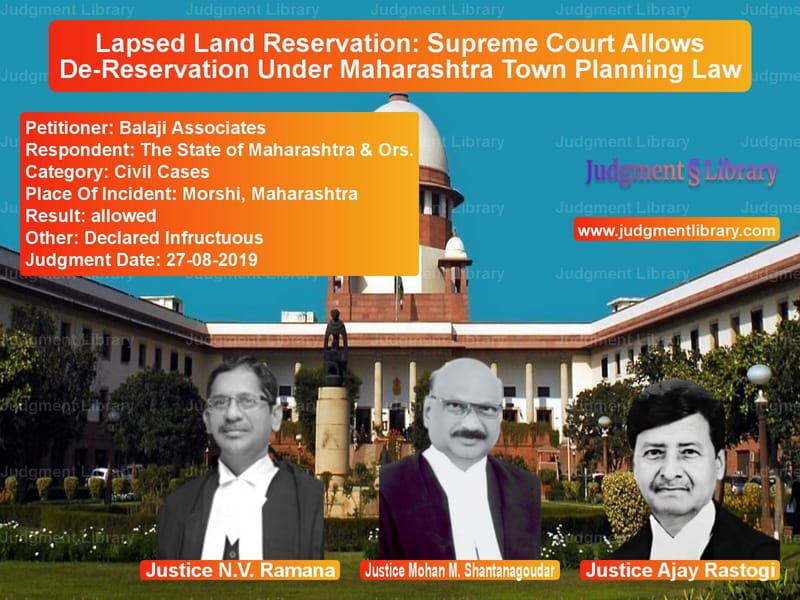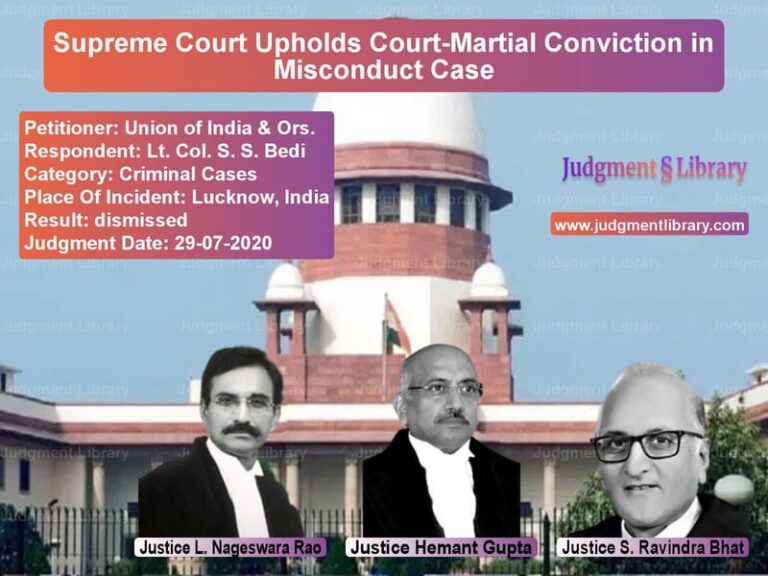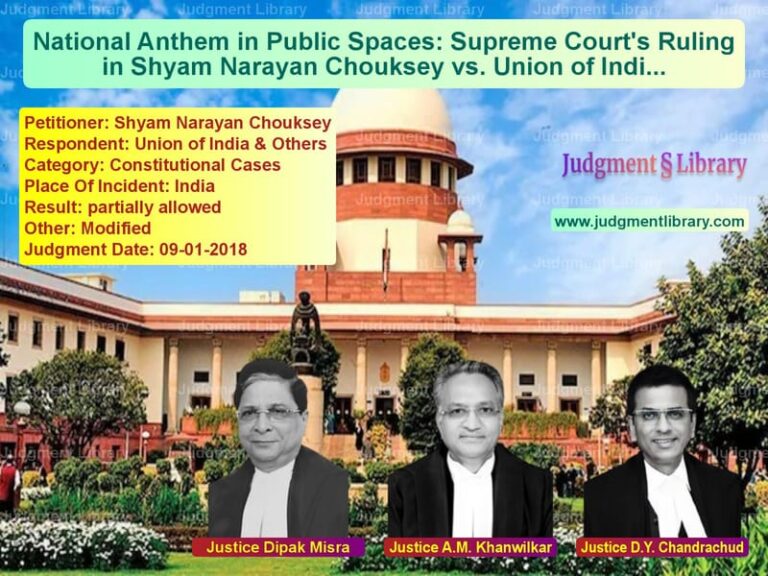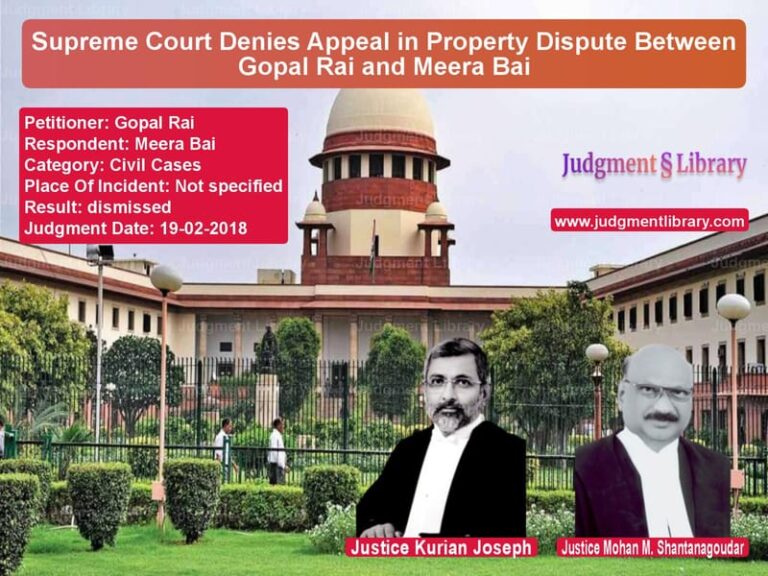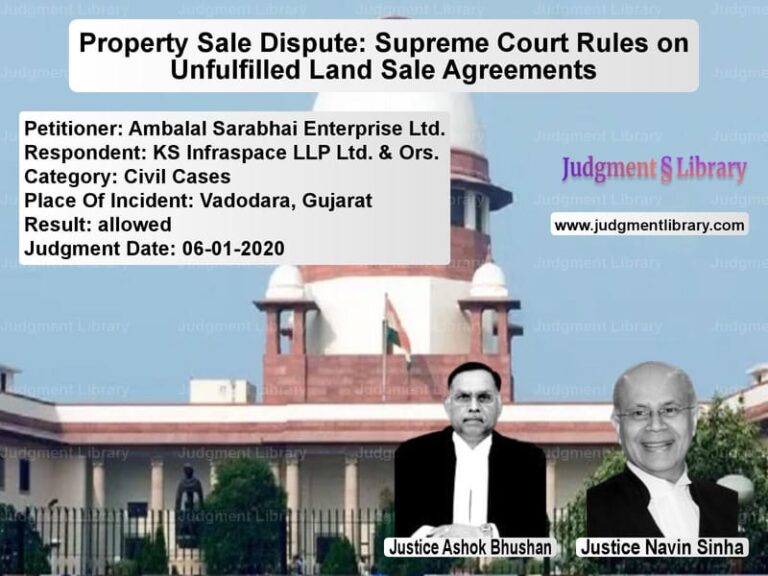Lapsed Land Reservation: Supreme Court Allows De-Reservation Under Maharashtra Town Planning Law
The case of Balaji Associates v. The State of Maharashtra & Ors. revolves around the interpretation of Section 127 of the Maharashtra Regional and Town Planning Act, 1966. The Supreme Court had to determine whether land reserved for public use could be deemed de-reserved if the government failed to acquire it within the statutory time frame.
Background of the Case
The appellant, Balaji Associates, was a partnership firm and the joint owner of land in Mouja Durgavada, Tq. Morshi, District Amravati. The land in question was included in the final development plan for Morshi, which came into force on September 1, 2005. The government reserved the appellant’s land for a shopping center and garden under Reservation Nos. 22 and 23.
As per Section 127 of the Maharashtra Regional and Town Planning Act, 1966, if the government does not acquire reserved land within ten years, the landowner can issue a notice demanding acquisition or de-reservation. If the authority fails to take necessary steps for acquisition within 24 months, the reservation lapses, and the land is released for private development.
On July 13, 2015, the appellant issued a notice to the municipal authority requesting either acquisition or permission to develop the land. However, the municipality rejected the notice as premature. The appellant sent a second notice on August 31, 2015, which was received on September 2, 2015. Despite municipal resolutions and submissions to acquire the land, no final acquisition was made.
Arguments of the Parties
Appellant (Balaji Associates):
- The land remained unacquired for over ten years, allowing the appellant to invoke Section 127 for de-reservation.
- The second notice was served after ten years, making it legally valid.
- The government’s failure to act within 24 months resulted in automatic de-reservation.
- The municipality’s mere initiation of the acquisition process was insufficient to prevent the lapse of reservation.
Respondents (State of Maharashtra & Municipal Authority):
- The appellant’s second notice was premature since the ten-year period ended on September 1, 2015.
- The municipal authority had initiated steps to acquire the land, preventing automatic de-reservation.
- The de-reservation process was subject to government discretion under Section 127(2) of the Act.
Supreme Court’s Observations
The Court analyzed the provisions of Section 127 and ruled that the statutory requirement of ten years had been met since the second notice was received on September 2, 2015. The Court emphasized:
“The statutory provision is clear and categorical. Section 127(1) mandates that if land is not acquired within ten years, the owner has the right to demand either acquisition or de-reservation.”
Regarding the steps taken by the municipal authority, the Court held:
“Mere forwarding of the proposal does not suffice. The municipality must take concrete steps for acquisition, failing which the landowner’s right to de-reservation is absolute.”
Final Judgment
The Supreme Court ruled in favor of the appellant, stating:
“As the 24 months’ period for acquisition has lapsed, the land reservation stands nullified, and the appellant is entitled to develop the land as per permissible norms.”
The Court also directed the government to notify the de-reservation in the Official Gazette within four months.
Key Takeaways from the Judgment
- Landowners have the right to de-reservation if land remains unacquired for ten years and authorities fail to act within 24 months of notice.
- Mere initiation of acquisition procedures does not prevent de-reservation.
- The government must publish the de-reservation in the Official Gazette once the conditions of Section 127(1) are met.
Implications of the Judgment
This ruling has a significant impact on landowners and urban planning authorities in Maharashtra. It ensures that reserved land is either acquired within a reasonable time or released for development, preventing indefinite restrictions on property rights.
Conclusion
The Supreme Court’s decision affirms the legal rights of landowners under Section 127 of the Maharashtra Regional and Town Planning Act, 1966. The judgment reinforces the principle that land acquisition must be completed within a reasonable timeframe, protecting landowners from indefinite restrictions on their property.
Petitioner Name: Balaji Associates.Respondent Name: The State of Maharashtra & Ors..Judgment By: Justice N.V. Ramana, Justice Mohan M. Shantanagoudar, Justice Ajay Rastogi.Place Of Incident: Morshi, Maharashtra.Judgment Date: 27-08-2019.
Don’t miss out on the full details! Download the complete judgment in PDF format below and gain valuable insights instantly!
Download Judgment: Balaji Associates vs The State of Maharas Supreme Court of India Judgment Dated 27-08-2019.pdf
Direct Downlaod Judgment: Direct downlaod this Judgment
See all petitions in Property Disputes
See all petitions in Landlord-Tenant Disputes
See all petitions in Damages and Compensation
See all petitions in Judgment by N.V. Ramana
See all petitions in Judgment by Mohan M. Shantanagoudar
See all petitions in Judgment by Ajay Rastogi
See all petitions in allowed
See all petitions in Declared Infructuous
See all petitions in supreme court of India judgments August 2019
See all petitions in 2019 judgments
See all posts in Civil Cases Category
See all allowed petitions in Civil Cases Category
See all Dismissed petitions in Civil Cases Category
See all partially allowed petitions in Civil Cases Category

